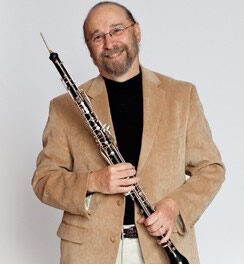Kent Lyman, whose formal title – academicians seem to love lengthy handles – is Associate Professor of Music and Coordinator of Piano Instruction at Meredith College in Raleigh, North Carolina, is a remarkable artist, by any measure. His appointment here in the wake of the retirement of James Clyburn was viewed by outsiders as something of a long shot, it wasn’t long after he arrived that the college’s hall flooded, damaging the pianos therein, and he (and Meredith) have had to deal with myriad issues related to financial stress, too. The best instrument in Carswell Concert Hall, a Yamaha, leaves much to be desired. And these are, generally speaking, tough times to be a pianist whose passion is for solo work. Lyman hasn’t been sitting idle, however. He’s played a lot – at Meredith and elsewhere. By dint of his artistry and advocacy, he has enhanced the school’s reputation as a cradle of fine pianism. And he’s managed to tend to all of his admin duties and public relations work and maintain his chops, too. Just how well he has done that was demonstrated during a recital offered in Carswell – played on that Yamaha – on April 29. The program itself was refreshingly varied, he wrote his own erudite notes, and he caused the instrument to sound remarkably fine throughout. A substantial crowd was on hand, too – always a plus. And for icing on the cake, the free event was followed by a reception at which the attendees could meet and talk with the artist.
Things got underway with Bach’s Partita No. 2, in c Minor, S.826. Say what you will about playing Bach on modern pianos, there are few composers whose music, deftly performed, is as rewarding – to players and listeners alike. Lyman revealed Bach in countless and always engaging ways, and he was enthusiastically applauded for his brilliant interpretation. There was more of the same in Beethoven’s Sonata No. 7, in D, Op. 10/3, a relatively early work that, as Lyman wrote, contains some of the master’s “darkest, most brooding music.” The artist let no moss grow in the opening movement; yes, it’s marked “presto,” but it flew out of the gate and never let up. (One of the things that made this so remarkable was that the piano sounded so good, under Lyman’s fingers – he must have invested hours of his time just figuring out the proper touch for each individual note.) The reading was as revealing as the Bach had been, and every bit as riveting, too.
Twentieth-century music dominated the second half of the intermission-less recital. From Messiaen’s eight Préludes (1928-9), Lyman selected the first (“La colombe”) and the last two (“Plainte calme” and “Un reflet dans le vent”). These bear immediately recognizable influences of Debussy but, at 20, the composer had already begun to develop his own unique voice – and his interest in bird songs (the first one is “The Dove”) and nature (the last is a comparatively lengthy and consistently powerful “Reflection in the Wind,” the title of which parallel’s Debussy’s “Reflects dans l’eau”).
Go-Hyang (1994), by David Burge, is a five-part homage to Korea and Koreans that – like some of the music played during the Raleigh Civic Symphony Association’s recent concerts – hints at Asian music without seeking to imitate it. The mostly short, richly varied pieces range from atmospheric to impressionistic, with several dramatic and repetitious intervening bits.
The grand finale probably took some in attendance by surprise: the Toccata-Rag, from Carnival Music (1971), by George Rochberg, is laden with blues and ragtime themes, masterfully presented in a toccata format that provided ample opportunity for Lyman to strut his virtuoso stuff. It was enough of a stem-winder that no encore was needed, although some folks clearly wanted one.
This program will be repeated during the second and third weeks of May, but it will be necessary to travel to Korea to hear it: from May 11-18, Lyman will offer solo recitals at Inje University, in Pusan, Kwandong University, in Kangreung, and Seoul’s Kookmin University, along with master classes in the latter two communities. Bon voyage.











